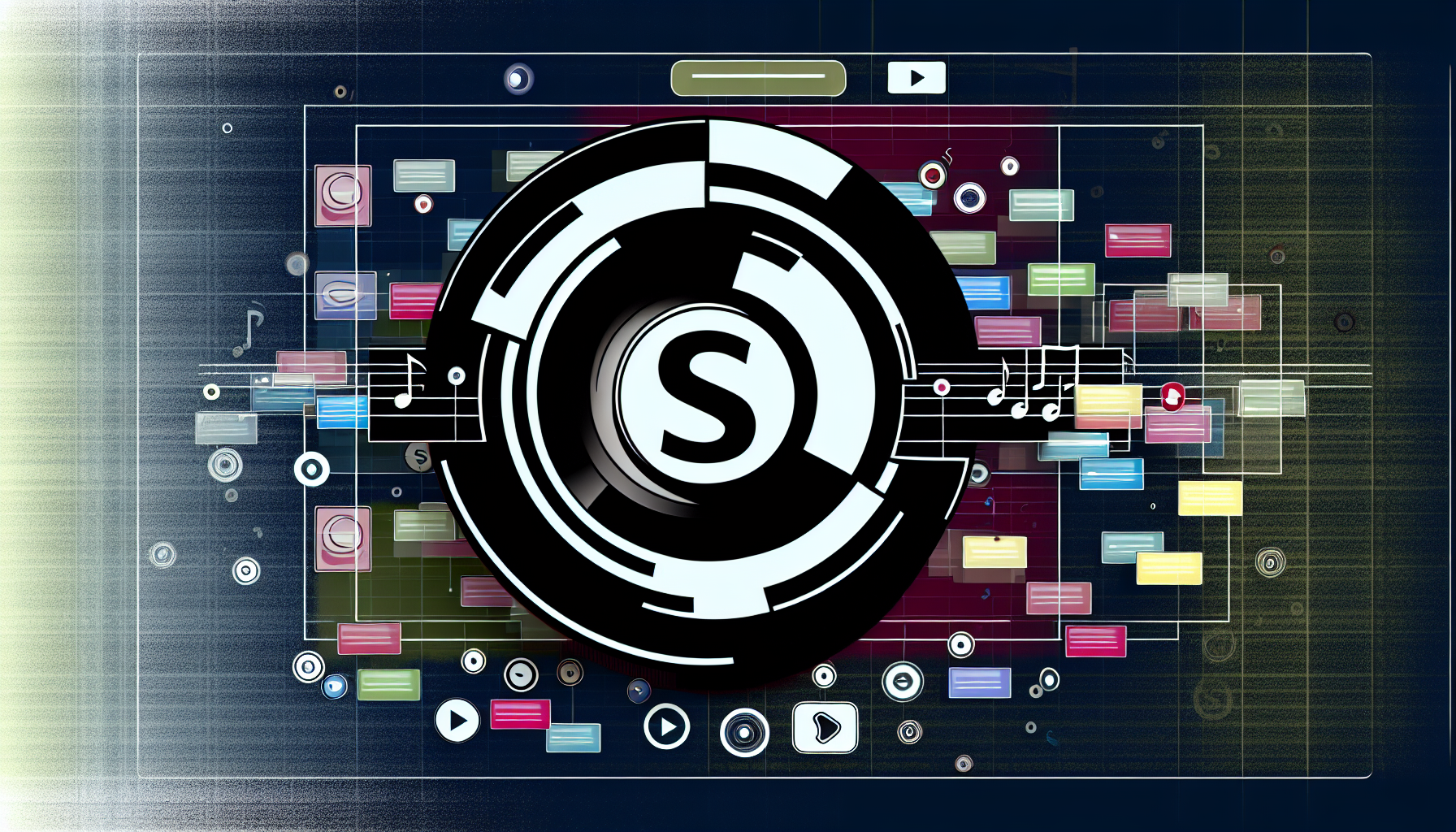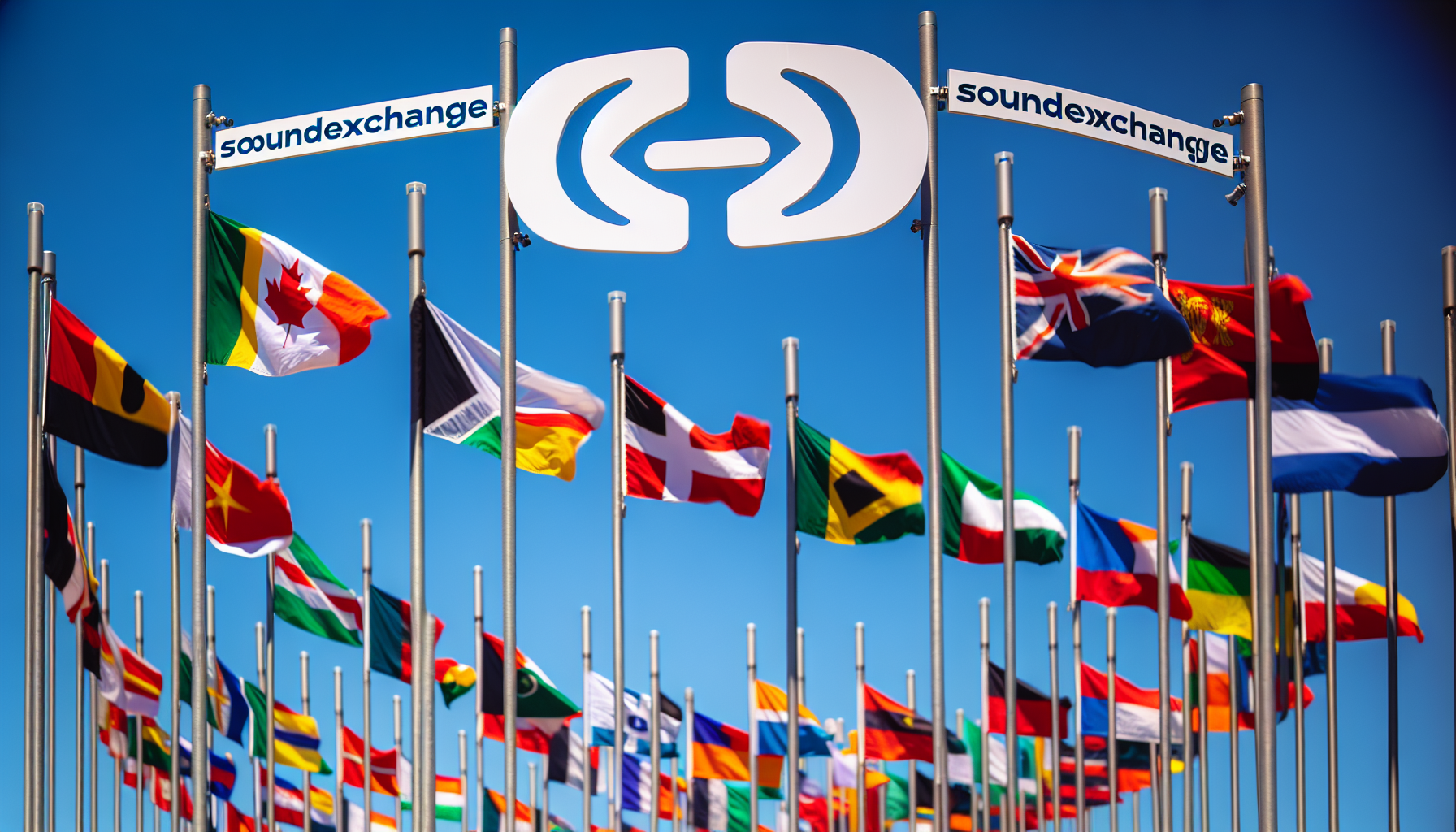
Why every musician should understand SoundExchange: Simply put, it’s about your money. SoundExchange is pivotal in managing digital performance royalties—a significant source of income in today’s music landscape. In this article, we explore how this platform can help you collect the earnings you’re entitled to and why being in the know could be the difference between missing out and maximizing your revenue.
The Essentials of SoundExchange for Musicians

SoundExchange, a vital non-profit entity within the recording industry association, has transformed the music sector by:
- Collecting and distributing digital performance royalties to both recording artists and sound recording proprietors.
- Amassing royalties from platforms that offer non-interactive digital music services.
- Appropriating these collected funds to musicians as well as owners of master recordings.
This process has markedly advantaged the musical sphere by guaranteeing equitable remuneration for creators and rights holders.
As an integral part of today’s rapidly changing digital realm in music, SoundExchange plays a crucial role in securing just compensation for performers.
Understanding Digital Performance Royalties
Digital performance royalties refer to the compulsory fees that must be disbursed to holders of sound recording copyrights when their music is played on digital services like Pandora and SiriusXM. The entities who receive and distribute these royalties encompass the owner of the sound recording copyright, along with featured artists and non-featured performers including musicians and singers involved in creating the track.
These particular types of royalties arise from what are known as non-interactive streams—instances where listeners do not have control over song selection, such as during public broadcasts or usage on certain streaming platforms. SoundExchange takes charge in amassing these royalties before allocating them appropriately amongst rightful owners.
The Role of SoundExchange
SoundExchange is responsible for gathering revenue by issuing licenses to entities that are not interactive, including services like internet radio stations and music channels on digital cable and satellite TV. Employing advanced technological systems, the company streamlines the process of managing these royalties. After a 4.6% fee is taken for administration, SoundExchange allocates the royalties as follows: half goes to whoever owns the sound recording rights. 45% is given to the artist prominently featured in it. And then the remaining 5% gets distributed amongst non-featured artists through associated groups.
Unlike songwriters and music publishers who typically obtain their royalties via separate organizations, record labels along with recording artists stand as the key recipients of income amassed by SoundExchange from such licensees.
The SoundExchange Advantage

SoundExchange stands out in the music industry by providing artists with complimentary access to sign up and immediate eligibility for digital performance royalties, positioning itself as the sole US organization responsible for gathering these specific royalties from sound recordings. SoundExchange sets a standard in music technology innovation through its offer of:
- Complimentary artist registration
- A more equitable and efficient streamlined process within the music industry
- Low overhead fees
- Timely payment distribution to artists via monthly direct deposits within 45 days.
Individuals who hold sound recording copyright can maintain oversight and authority over their dealings with SoundExchange. By utilizing features like Search & Claim, Submit Recordings, and addressing Overlaps & Disputes available on the SX Direct portal, those owning sound recording copyrights are empowered to adeptly oversee their rights.
Why Register With SoundExchange?
Music creators and record labels must register with SoundExchange to obtain the digital performance royalties due to them. This organization is critical in aiding artists in collecting already accrued royalties and securing their ability to gather future earnings.
The Power of SoundExchange Direct
SoundExchange Direct acts as a digital platform for account administration, providing musicians with the ability to control and monitor their royalty payments and music catalog. This portal includes functionalities such as Search & Claim along with Submit Recordings, enabling artists to update their catalog information, manage any conflicts or overlaps in data, and oversee the tracking of their musical works and corresponding revenue. Through SoundExchange Direct’s enhanced management options, artists can enjoy greater control over their account details, transparency regarding royalty payments they are owed, and opportunities for collaboration facilitated by SoundExchange.
By streamlining the process of distributing royalties efficiently among creators through this online system allows them to amend performance credits linked to their accounts easily, which secures precise collection practices.
SoundExchange in Action: Real-World Impact

SoundExchange is not merely an abstract idea. Its concrete and quantifiable influence on the music industry is significant. From its inception in 2003, it has successfully allocated close to $8 billion in royalties directly to those who create music.
Among those who have reaped rewards from SoundExchange’s services is Bryce Xavier, a versatile recording artist encompassing skills as a singer-songwriter and actor. Leveraging his notable social media presence, he has capitalized on SoundExchange for financial gain within his expanding musical endeavors.
From Emerging Talent to Chart-Toppers
By overseeing the collection and disbursement of digital performance royalties, SoundExchange plays a crucial role in nurturing up-and-coming artists within the music industry. An illustration of this support is seen in Bryce Xavier’s success with his track ‘Romeo,’ which has amassed 3.7 million streams on Spotify, showcasing how services from SoundExchange can aid emerging musicians.
Advocacy and Industry Support
SoundExchange is dedicated to the task of not only making sure that digital music services adhere to their legal duties, but also standing up for music creators by fighting for equitable remuneration. It remains unwavering in its mission to safeguard the rights of these creators, ensuring they are fairly rewarded for their creative outputs.
By taking a leading role in championing initiatives designed to defend legacy artists and confronting unfair business practices employed by major digital music providers, SoundExchange played a pivotal role in the enactment of the Music Modernization Act.
Navigating the Digital Landscape
In today’s digital music landscape, SoundExchange plays a pivotal role by concentrating on the accumulation and dispersion of digital performance royalties. It is important to note that their jurisdiction lies within non-interactive digital services, allowing artists to pursue direct licensing arrangements for interactive platforms which fall outside the scope of SoundExchange.
Navigating through the intricate network that comprises different digital music services and entities responsible for royalty collection is essential for artists seeking to optimize their revenue streams in this sector.
Non-Interactive vs. Interactive Streaming Services
Artists from television and radio find platforms that suit their needs in both non-interactive and interactive streaming services. Non-interactive options, including Pandora, Sirius XM, NPR, iHeart Radio, Last.FM, and SiriusXM, grant listeners a more traditional radio experience where they have limited influence over the songs played. Conversely, interactive platforms such as Spotify, Apple Music, Deezer, and Tidal empower users with the ability to pick exact tracks they want to hear while giving them control to skip or replay songs whenever desired.
SoundExchange plays distinct yet important roles across these service types for maintaining its relevance among artists involved in television or radio.
SoundExchange and Other Music Services
While SoundExchange is responsible for collecting royalties from non-interactive digital platforms, it does not have jurisdiction over on-demand music streaming services such as Spotify and Apple Music.
The following interactive music streaming services fall outside the purview of SoundExchange:
- Spotify
- Apple Music
- Amazon Music
- Rhapsody
- Google Play
These particular streaming services function autonomously, without oversight by SoundExchange.
Financial Insights and Earnings

SoundExchange’s activities significantly influence the financial wellbeing of creators. In the year 2020, close to $947 million was allocated by SoundExchange in performance royalties to its members. Since its inception, it has been responsible for disbursing over $7 billion in royalties and currently services more than 200,000 accounts held by music creators.
This organization is recognized for maintaining one of the smallest administration rates within the industry. This efficiency ensures that a larger portion of earnings is funneled back to artists and rights holders.
Digital Performance Royalty Rates
The rates for digital performance royalties, which are critical to determining the compensation artists earn from non-interactive streaming services, are established by the U.S. Copyright Royalty Board.
Unclaimed Royalties: Don't Leave Money on the Table
Remarkably, substantial sums of money from SoundExchange revenues are yet to be claimed by many music creators—including musicians, producers, or record labels—primarily because they have either not registered or their filings are incomplete. To facilitate fair compensation for artists, SoundExchange keeps updated records indicating the status of those individuals who have earnings collected on their behalf but remain unclaimed.
Beyond Royalties: Additional Benefits of SoundExchange
Being a part of SoundExchange offers members more than just royalties. It also grants access to an extensive array of networking prospects within its large international community. This community is comprised of over 650,000 members, which encompass artists, labels, and music publishers alike.
Building Connections Within the Industry
Membership with SoundExchange provides artists the opportunity to expand their professional network and collaborate with peers by participating in various industry events, workshops, and conferences. This involvement allows members to immerse themselves within the music community through engagement and connection-building opportunities.
Global Reach of SoundExchange

Operating worldwide, SoundExchange is acknowledged as the preeminent neighboring rights organization on a global scale. It boasts agreements that span 80% of the international neighboring rights market, excluding the U.S. With upwards of 45 collection arrangements established, it has forged partnerships with Collective Management Organizations across more than 50 different countries to provide its services in numerous international jurisdictions.
International Collections
Through its worldwide neighboring rights services, SoundExchange ensures that creators are compensated with the royalties due to them for their music being played internationally. By having collection agreements with partner organizations across various countries, SoundExchange guarantees that artists obtain the rightful earnings from their music’s international airplay.
Taking Your Music Global
SoundExchange offers a service for artists to increase their global footprint and income by enabling them to choose specific territories where they wish representation for the gathering of international royalties upon registering with SoundExchange.
Summary
In essence, SoundExchange is a key player in the music industry’s digital realm. It functions by amassing and disbursing digital performance royalties while championing equitable compensation. It offers avenues for networking and advancing careers for its members. For artists at any stage of their career, from newcomers to those leading the charts, utilizing SoundExchange’s services can be instrumental in effectively maneuvering through the intricate terrain of performance royalties within the digital music sector.
To learn how to apply the ins and outs of this and maximize your royalties, check out the course, "Amplify Your Voice!". It's an Artist Development course that serves as more than a mere platform for networking. Musicians looking to advance their careers can take advantage of this offering by enrolling in the course to enhance their abilities and deepen their understanding of the industry, resulting in higher income from multiple music streams, including more royalties.
Frequently Asked Questions
What does SoundExchange do for musicians?
SoundExchange operates as a non-profit entity, pivotal in the collection and distribution of performance royalties for sound recordings. This organization ensures that recording artists and master rights owners are fairly remunerated by various digital music services when their works are used.
This institution is instrumental in safeguarding the interests of musicians, guaranteeing they obtain equitable payment for their creative output through the administration of digital performance royalties.
Why do I need SoundExchange?
By enrolling with SoundExchange, you can secure the collection of digital performance royalties in the United States for your sound recordings. This registration guarantees that any performance royalties due to you for sound are properly disbursed.
What percentage of money collected from SoundExchange goes to artists?
SoundExchange distributes 45 percent of the performance royalties it collects to the featured artists associated with a sound recording. They allocate an extra 5 percent to a fund specifically for non-featured artists. The sound recording copyright owner receives the remaining half of these royalties, accounting for 50 percent.
Does SoundExchange collect royalties from Spotify?
Yes, SoundExchange collects performance royalties from Spotify and other non-interactive streaming services, distributing them to the owners of the copyright.
What is the difference between non-interactive and interactive streaming services?
Interactive streaming services empower users by enabling them to choose precise songs and exercise greater command over playback, unlike non-interactive streaming platforms that provide streams akin to radio broadcasts with constrained user control.








































0 Comments